Prime Minister Modi is scheduled to visit the United Arab Emirates (UAE), Bahrain and France this week to boost bilateral ties with these states. The visit comes in the wake of support that India has received from these countries after New Delhi decided to scrap Article 370 from its constitution, which gave special status to the state of Jammu and Kashmir (J&K). Modi government has worked hard to build close ties with the Gulf monarchies as well as France in recent years. PM’s visit summarises the hands-on approach of the present government, which has helped India achieve its recent successes in foreign policy. Hardly any country other than China supported the Pakistani tantrums after India’s decision on J&K earlier this month.
Gulf monarchies have traditionally supported Pakistan and stayed hostile to India in the past. This has been due to the clever use of the religion card by Pakistan. However, Islamabad’s hesitation in joining the Saudi Arabia led Islamic military alliance (dubbed the Muslim NATO) in 2015 gave India an opening, which the foreign policy establishment of the Modi government has successfully exploited. This is not to say that the two sides didn’t or do not have common grounds to cooperate if we discount the Pakistan factor. In fact, there is immense potential for India to further expand its engagement with these countries.
Economies of the Gulf monarchies depend on the sale of their petroleum and natural gas resources. The advent of Shale oil and changes in legislations in the United States (US) has caused difficulties for the oil exporting countries of the Gulf. In fact, the US has emerged as the largest producer of crude oil in the last couple of years. Therefore, it has stopped importing oil from its allies in the Persian Gulf. On the other hand, the change in laws in the US in 2015, now allows Washington to export its own oil. As a result, the existing oil exporting states have a new competitor to contend with. At the same time, the Indian economy is growing at a rapid pace and it needs fuel to continue its upward trajectory. Bulk of its energy imports come from the Persian Gulf. It is no surprise then that the Gulf monarchies want to plug into the Indian oil market. The earlier decision by the UAE to fill the Indian strategic reserves with its oil and the recent one by Saudi Arabia to buy a 20 percent stake in Reliance’s Jamnagar refinery must be seen in this light. Apart from economic cooperation, India is also engaging the Gulf monarchies on security. The two sides have identified extremism and terrorism as a major threat.
Gulf monarchies have a history of supporting Wahabi Islamic radicals in the region. It must be recalled that the UAE and Saudi Arabia were the only two countries other than Pakistan, which recognised the Taliban government in Afghanistan in 1997. However, much water has passed under the bridge since. The Gulf monarchies have realised that radical Islamism threatens them as much it threatens the rest of the world. As a result, they have shown earnest desire to curb this growing menace. Both Riyadh and Abu Dhabi have been cooperating with India on this front. The repeated extradition of terrorists sought by New Delhi is an example.
There is a huge scope for cooperation between the two sides on security related issues beyond terrorism. Currently, there are four centres of power in West Asia - Turkey, Iran, Saudi Arabia and Israel. The three Muslim majority states, among the four, are suspicious of each other and are competing for leadership of the Islamic world. The Gulf monarchies have difficult relationships with both Iran and Turkey. While Iran is an immediate threat, Turkey’s support of Islamic radicals is also a long-term problem, which needs to be addressed.
India has vital interests in Iran. New Delhi seeks to maintain good ties with the Shia state which borders Pakistan on the West. India has also invested heavily in the Chabahar port in Iran and expects the country to provide access to Afghanistan, Central Asia, Caucasus and beyond, through the proposed International North South Transport Corridor (INSTC). Therefore, it wouldn't be prudent for New Delhi to take a harsher stance on Iran than it is already doing currently, due to American pressure.
However, it is on Turkey where Indian interests converge with those of the Gulf Monarchies. Since the advent of Recep Tayyip Erdogan to power, Ankara has been steadily taking an anti-India stand on various forums. It was the only country which backed Pakistan at the FATF (Financial Action Task Force) meet in June 2018 and did so again recently with China and Malaysia. It has also equated Indian application for joining the Nuclear Suppliers Group (NSG) with that of Pakistan’s, effectively blocking India. In the past, Turkey has parroted Pakistan’s line on Kashmir and even went to the extent of offering mediation on the issue.
But it is in West Asia, where Turkey has been really active and is supporting dangerous extremist ideologies. It is common knowledge that most foreign fighters who joined ISIS, did so after travelling to Turkey first. In fact, Ankara supported some of the most radical elements during the Syrian civil war. It continues to do so in Idlib, where the same jihadis are surrounded by Syrian forces currently. The Erdogan regime has also supported Muslim brotherhood in Egypt and Hamas in Palestine. This has led to friction with Egypt and Israel respectively.
Gulf monarchies have no love lost for Erdogan either. There is mutual loathing on all sides. Turkey’s ally in the Persian Gulf, Qatar, is blockaded by Saudi Arabia, Bahrain and the UAE since June 2017. Doha has been accused by other monarchies of supporting terrorism, same as Turkey. To support the beleaguered state, Erdogan has deployed 3000 Turkish troops in Qatar. The other monarchies see this as blatant Ottoman interference in Arab affairs. Moreover, harsh words have been exchanged between the UAE and Saudi Arabia on one side and Erdogan on the other. In December 2017, the UAE Foreign Minister Sheikh Abdullah bin Zayed al Nahyan, accused Erdogan’s ancestors of stealing from Medina residents during the First World War. Erdogan reacted by telling the minister to ‘know his place’ and that ‘oil wealth had spoilt the Emiratis’. Last year, the Turkish government chose to leak selective details about the murder of Saudi journalist Jamal Kashoggi in the Saudi embassy in Ankara. It was a clear attempt to damage the reputation of Prince Mohammad bin Salman, the de facto ruler of Saudi Arabia.
Till now, India has refrained from commenting on conflicts far away from its geography. This has been true for both the Syrian civil war as well as the conflict in Ukraine. This policy has helped India stay out of the crosshairs of rival powers. However, the needless hostility shown by the Erdogan regime towards India deserves a response. Ankara’s illegal forays across the border into Syrian territory and its support to radical jihadis must be unequivocally condemned by India.
India needs to coordinate its efforts with the Gulf monarchies who have even less reasons to like Erdogan. Also, if New Delhi seeks to dive into the zero-sum equations of West Asia, it could seek equal response from the Gulf monarchies to its own sensitivities. The UAE and Saudi Arabia have been supporting Pakistan through various diplomatic and economic means. This emboldens Pakistan to continue its hostility towards India. If Saudi Arabia and the UAE were to stop supporting Pakistan, it will make it easier for New Delhi to convince Pakistan of the futility of its hostile policies. New Delhi could test the waters in the region for such a quid pro quo between the two sides. If Delhi plays its cards well, it could gain a lot.
(The paper is the author’s individual scholastic articulation. The author certifies that the article/paper is original in content, unpublished and it has not been submitted for publication/web upload elsewhere, and that the facts and figures quoted are duly referenced, as needed, and are believed to be correct). (The paper does not necessarily represent the organisational stance... More >>
Image Source: http://i1.wp.com/southasiajournal.net/wp-content/uploads/2017/01/pm-modi-uae_650x400_61439752495.jpg?fit=650%2C400





.jpeg)




Post new comment